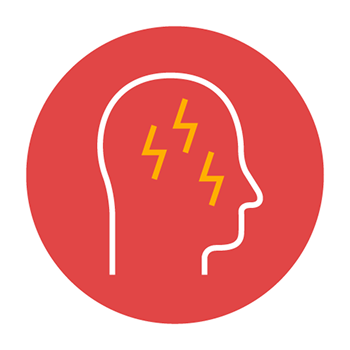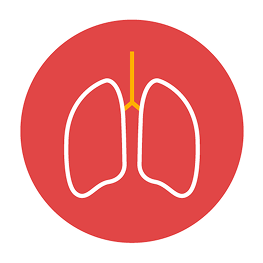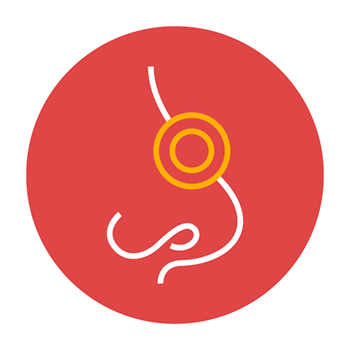
A full life with Chronic Nasal Polyps (CRSwNP)
Because life with CRSwNP
can be unpredictable, it helps to know how it may affect you. That way, you can work with your doctor to create a treatment plan that’s tailored to you. CRSwNP shouldn’t stop you enjoying life to the full.
Experiencing complications
CRSwNP may bring some additional health challenges, so it’s important to speak to your doctor and address them promptly.

Sinus infections
Ongoing inflammation in your
sinuses can increase the risk of
sinus infections. These can cause
facial pain, pressure, nasal
congestion and discharge.

Asthma
When you have CRSwNP, your asthma may be more difficult to control and more prone to flare-ups, with increased blockage of the airways. You may need to speak with your doctor about the dose of your asthma medications.

Severe obstruction
In severe cases, if nasal polyps are
left untreated, they can grow large enough to obstruct the airway.
This makes it difficult to breathe and smell, and also increases the risk
of sleep disturbance.
Your nasal polyps may come back after surgery (recurrence)
You might think that removing your polyps will mean an end to all your CRSwNP symptoms. Unfortunately, there are no guarantees. Even after having surgery, your nasal polyps could and often do come back months or years later.
The reason why recurrence happens is that surgery removes the growths in your nose, but it doesn’t tackle a potential cause of CRSwNP: Type 2 inflammation.
There are several
treatments
that may be prescribed before or after
surgery
to prevent your nasal polyps from coming back including:
Biologics can treat the Type 2 inflammation that causes your CRSwNP
Looking after your mental health and well-being
Dealing with the symptoms. of a chronic condition like CRSwNP can take its toll. It’s a condition that’s largely unknown and often misunderstood, which can be quite isolating. Feeling ill for an extended period of time can have a knock-on effect on your quality of life and how you feel.
If you’re struggling to sleep or dealing with frustrating symptoms every day, it may affect your mental and physical health. It could also impact your personal relationships, your ability to work or your enjoyment of simple things like exercising or playing with your kids.
Check your symptoms
Our handy symptom checker can help you assess whether your CRSwNP is under control. It’s a simple questionnaire that asks you about your symptoms and how they’re affecting you. You can then share your results with your doctor so you get the right treatment and care for you.

50% of people living with CRSwNP experience disrupted sleep
Not being able to sleep properly may increase
anxiety and depression, or leave you feeling tired
and unable to concentrate, which can interfere with
work and other areas of your life.

1 in 4 people living with CRSwNP say their condition significantly impacts their emotional and mental health.
Because the symptoms of CRSwNP (e.g. nasal congestion, reduced sense of smell, facial pain) can be persistent, they may affect your quality of life and well-being.
Talk with your doctor
Use this handy to support conversations with your doctor about the best treatment and management options for you.
